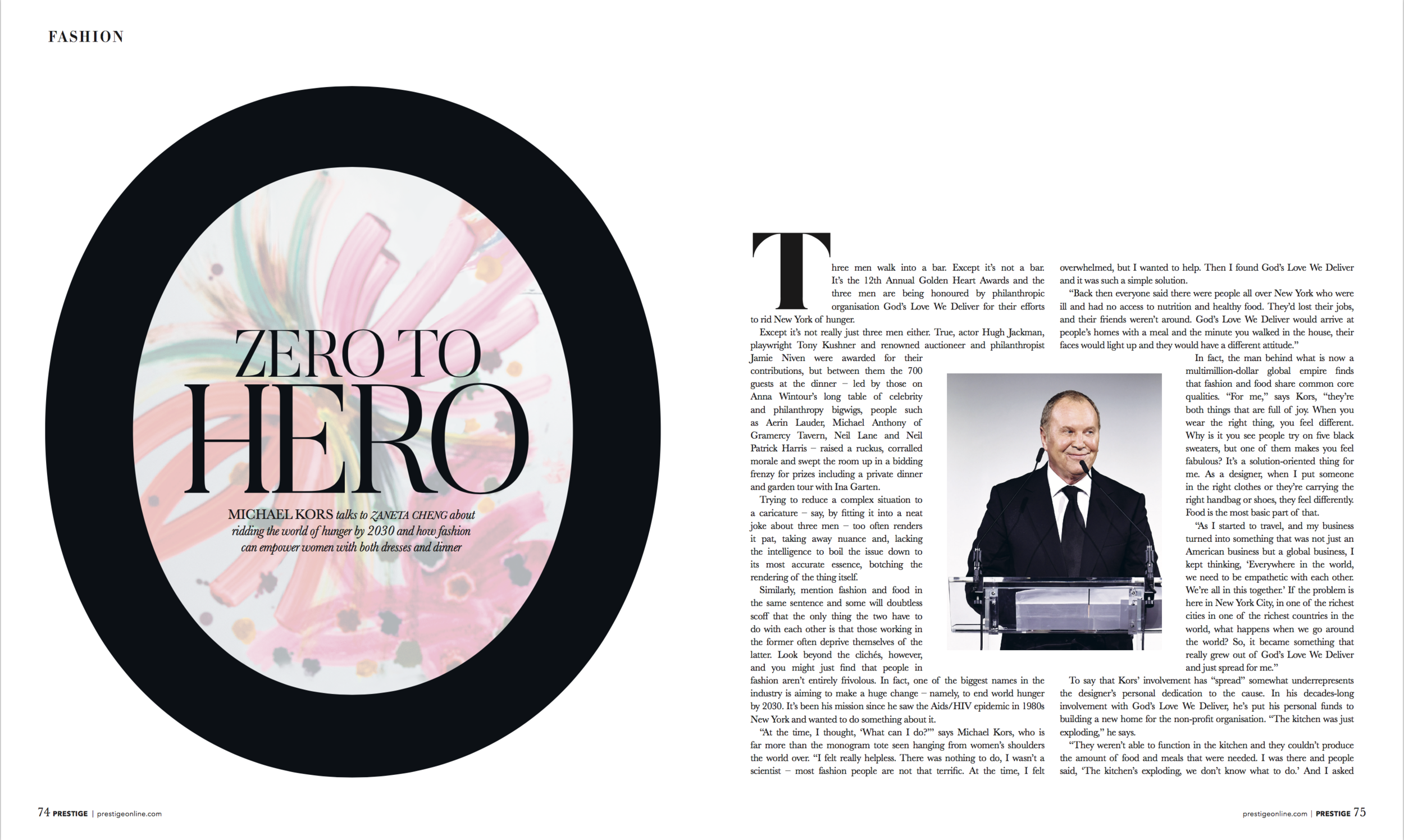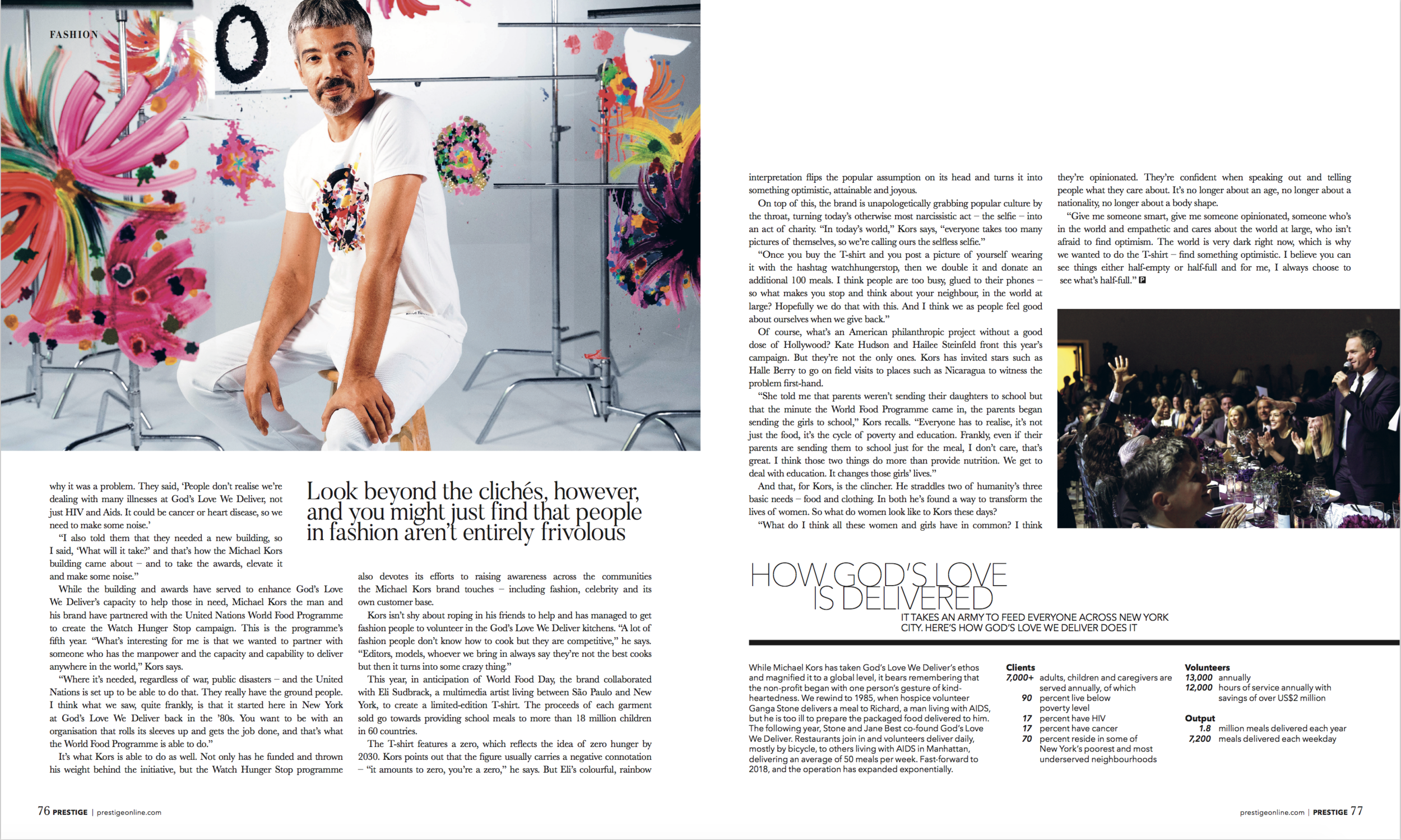Michael Kors (Watch Hunger Stop) | Prestige Hong Kong (Dec 18)
Michael Kors talks to zaneta cheng about ridding the world of hunger by 2030 and how fashion can empower women with both dresses and dinner
Three men walk into a bar. Except it’s not a bar. It’s the 12th Annual Golden Heart Awards and the three men are being honoured by philanthropic organisation God’s Love We Deliver for their efforts to rid New York of hunger.
Except it’s not really just three men either. True, actor Hugh Jackman, playwright Tony Kushner and renowned auctioneer and philanthropist Jamie Niven were awarded for their contributions, but between them the 700 guests at the dinner – led by those on Anna Wintour’s long table of celebrity and philanthropy bigwigs, people such as Aerin Lauder, Michael Anthony of Gramercy Tavern, Neil Lane and Neil Patrick Harris – raised a ruckus, corralled morale and swept the room up in a bidding frenzy for prizes including a private dinner and garden tour with Ina Garten.
Trying to reduce a complex situation to a caricature – say, by fitting it into a neat joke about three men – too often renders it pat, taking away nuance and, lacking the intelligence to boil the issue down to its most accurate essence, botching the rendering of the thing itself.
Similarly, mention fashion and food in the same sentence and some will doubtless scoff that the only thing the two have to do with each other is that those working in the former often deprive themselves of the latter. Look beyond the clichés, however, and you might just find that people in fashion aren’t entirely frivolous. In fact, one of the biggest names in the industry is aiming to make a huge change – namely, to end world hunger by 2030. It’s been his mission since he saw the Aids/HIV epidemic in 1980s New York and wanted to do something about it.
“At the time, I thought, ‘What can I do?’” says Michael Kors, who is far more than the monogram tote seen hanging from women’s shoulders the world over. “I felt really helpless. There was nothing to do, I wasn’t a scientist – most fashion people are not that terrific. At the time, I felt overwhelmed, but I wanted to help. Then I found God’s Love We Deliver and it was such a simple solution.
“Back then everyone said there were people all over New York who were ill and had no access to nutrition and healthy food. They’d lost their jobs, and their friends weren’t around. God’s Love We Deliver would arrive at people’s homes with a meal and the minute you walked in the house, their faces would light up and they would have a different attitude.”
In fact, the man behind what is now a multimillion-dollar global empire finds that fashion and food share common core qualities. “For me,” says Kors, “they’re both things that are full of joy. When you wear the right thing, you feel different. Why is it you see people try on five black sweaters, but one of them makes you feel fabulous? It’s a solution-oriented thing for me. As a designer, when I put someone in the right clothes or they’re carrying the right handbag or shoes, they feel differently. Food is the most basic part of that.
“As I started to travel, and my business turned into something that was not just an American business but a global business, I kept thinking, ‘Everywhere in the world, we need to be empathetic with each other. We’re all in this together.’ If the problem is here in New York City, in one of the richest cities in one of the richest countries in the world, what happens when we go around the world? So, it became something that really grew out of God’s Love We Deliver and just spread for me.”
To say that Kors’ involvement has “spread” somewhat underrepresents the designer’s personal dedication to the cause. In his decades-long involvement with God’s Love We Deliver, he’s put his personal funds to building a new home for the non-profit organisation. “The kitchen was just exploding,” he says.
“They weren’t able to function in the kitchen and they couldn’t produce the amount of food and meals that were needed. I was there and people said, ‘The kitchen’s exploding, we don’t know what to do.’ And I asked why it was a problem. They said, ‘People don’t realise we’re dealing with many illnesses at God’s Love We Deliver, not just HIV and Aids. It could be cancer or heart disease, so we need to make some noise.’
“I also told them that they needed a new building, so I said, ‘What will it take?’ and that’s how the Michael Kors building came about – and to take the awards, elevate it and make some noise.”
While the building and awards have served to enhance God’s Love We Deliver’s capacity to help those in need, Michael Kors the man and his brand have partnered with the United Nations World Food Programme to create the Watch Hunger Stop campaign. This is the programme’s fifth year. “What’s interesting for me is that we wanted to partner with someone who has the manpower and the capacity and capability to deliver anywhere in the world,” Kors says.
“Where it’s needed, regardless of war, public disasters – and the United Nations is set up to be able to do that. They really have the ground people. I think what we saw, quite frankly, is that it started here in New York at God’s Love We Deliver back in the ’80s. You want to be with an organisation that rolls its sleeves up and gets the job done, and that’s what the World Food Programme is able to do.”
It’s what Kors is able to do as well. Not only has he funded and thrown his weight behind the initiative, but the Watch Hunger Stop programme also devotes its efforts to raising awareness across the communities the Michael Kors brand touches – including fashion, celebrity and its own customer base.
Kors isn’t shy about roping in his friends to help and has managed to get fashion people to volunteer in the God’s Love We Deliver kitchens. “A lot of fashion people don’t know how to cook but they are competitive,” he says. “Editors, models, whoever we bring in always say they’re not the best cooks but then it turns into some crazy thing.”
This year, in anticipation of World Food Day, the brand collaborated with Eli Sudbrack, a multimedia artist living between São Paulo and New York, to create a limited-edition T-shirt. The proceeds of each garment sold go towards providing school meals to more than 18 million children in 60 countries.
The T-shirt features a zero, which reflects the idea of zero hunger by 2030. Kors points out that the figure usually carries a negative connotation – “it amounts to zero, you’re a zero,” he says. But Eli’s colourful, rainbow interpretation flips the popular assumption on its head and turns it into something optimistic, attainable and joyous.
On top of this, the brand is unapologetically grabbing popular culture by the throat, turning today’s otherwise most narcissistic act – the selfie – into an act of charity. “In today’s world,” Kors says, “everyone takes too many pictures of themselves, so we’re calling ours the selfless selfie.”
“Once you buy the T-shirt and you post a picture of yourself wearing it with the hashtag watchhungerstop, then we double it and donate an additional 100 meals. I think people are too busy, glued to their phones – so what makes you stop and think about your neighbour, in the world at large? Hopefully we do that with this. And I think we as people feel good about ourselves when we give back.”
Of course, what’s an American philanthropic project without a good dose of Hollywood? Kate Hudson and Hailee Steinfeld front this year’s campaign. But they’re not the only ones. Kors has invited stars such as Halle Berry to go on field visits to places such as Nicaragua to witness the problem first-hand.
“She told me that parents weren’t sending their daughters to school but that the minute the World Food Programme came in, the parents began sending the girls to school,” Kors recalls. “Everyone has to realise, it’s not just the food, it’s the cycle of poverty and education. Frankly, even if their parents are sending them to school just for the meal, I don’t care, that’s great. I think those two things do more than provide nutrition. We get to deal with education. It changes those girls’ lives.”
And that, for Kors, is the clincher. He straddles two of humanity’s three basic needs – food and clothing. In both he’s found a way to transform the lives of women. So what do women look like to Kors these days?
“What do I think all these women and girls have in common? I think they’re opinionated. They’re confident when speaking out and telling people what they care about. It’s no longer about an age, no longer about a nationality, no longer about a body shape.
“Give me someone smart, give me someone opinionated, someone who’s in the world and empathetic and cares about the world at large, who isn’t afraid to find optimism. The world is very dark right now, which is why we wanted to do the T-shirt – find something optimistic. I believe you can see things either half-empty or half-full and for me, I always choose to see what’s half-full.”

